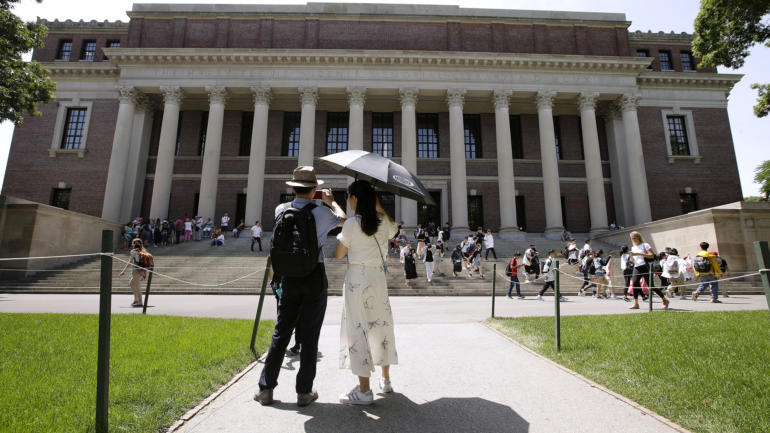A judge ruled this week that Harvard University does not discriminate against Asian Americans in admissions. The decision was a win for Harvard and other universities that consider race among other factors in admissions but the battle over affirmative action isn’t likely over. CGTN’s Karina Huber reports.
A lawsuit launched five years ago against Harvard University alleges the school intentionally discriminates against Asian Americans in admissions using racial balancing.
The judge deciding the case disagreed.
“While the admissions process may be imperfect,” said Federal District Court Judge Allison D. Burroughs. “The Court finds no persuasive documentary evidence of any racial animus or conscious prejudice against Asian Americans.”
She also noted that Asian Americans are over-represented at Harvard. They now make up 25 percent of the freshman class while only making up five percent of the U.S. population.
In a statement, Harvard’s president, Lawrence S. Bacow said “Today we reaffirm the importance of diversity — and everything it represents to the world.”
The case against Harvard was brought forth by Students for Fair Admissions, which represents a group of Asian Americans rejected by Harvard. They claim that despite strong test scores and grades, Asian-Americans are often downgraded in their so-called “personal rating” – an assessment that looks at qualities like courage, grit and humor. They said this is because of stereotyping.
Swan Lee of the Asian American Coalition for Education filed an amicus brief in support of the plaintiffs.
“Consistently – year after year- Harvard rates Asian American applicants much lower in these categories than students of all the other racial groups so these are ongoing racial stereotypes Harvard uses to discriminate,” she said.
The judge said Harvard would benefit from implicit-bias training. Harvard said it has made changes to tackle the problem. Lee isn’t satisfied.
“As long as Harvard does not admit to racial discrimination against Asian American students, there won’t be any significant and sustainable changes to the admissions system,” said Lee.
The case is seen as the biggest challenge to affirmative action in years. Legal experts believe it is just the beginning of a more protracted battle.
“I really think that this controversy is going to continue. It’s been going on for a long time. The plaintiffs have already said that they’re going to appeal this decision. So, we know there’s at least one more round of litigation. Then they’ll undoubtedly – one side of the other – seek review by the United States Supreme Court,” said Rachel F. Moran, Dean Emerita at UCLA School of Law.
The U.S. Department of Justice has also launched investigations into the admissions practices of Harvard and Yale.
Moran said the odds of the high court hearing the case are slim as they reaffirmed the constitutionality of affirmative action in higher education in 2016.
“So they may not feel that this is ripe for yet another round of review,” she said.
For now, Harvard can legally continue to consider race among other factors in its admissions process but the future of the program is uncertain as affirmative action faces more challenges.
 CGTN America
CGTN America
 FILE – In this July 16, 2019, file photo, people stop to record images of Widener Library on the campus of Harvard University in Cambridge, Mass. U.S. District Judge Allison D. Burroughs ruled, Tuesday, Oct. 1, 2019, that Harvard does not discriminate against Asian Americans in its admissions process. The judge issued the ruling in a 2014 lawsuit that alleged Harvard holds Asian American applicants to a higher standard than students of other races. Burroughs said Harvard’s admissions process is not perfect but passes constitutional muster. (AP Photo/Steven Senne, File)
FILE – In this July 16, 2019, file photo, people stop to record images of Widener Library on the campus of Harvard University in Cambridge, Mass. U.S. District Judge Allison D. Burroughs ruled, Tuesday, Oct. 1, 2019, that Harvard does not discriminate against Asian Americans in its admissions process. The judge issued the ruling in a 2014 lawsuit that alleged Harvard holds Asian American applicants to a higher standard than students of other races. Burroughs said Harvard’s admissions process is not perfect but passes constitutional muster. (AP Photo/Steven Senne, File)
